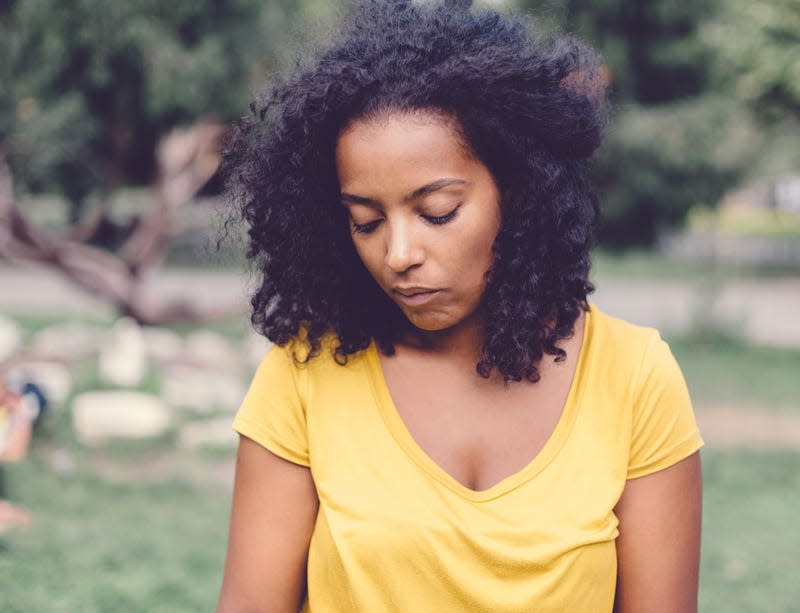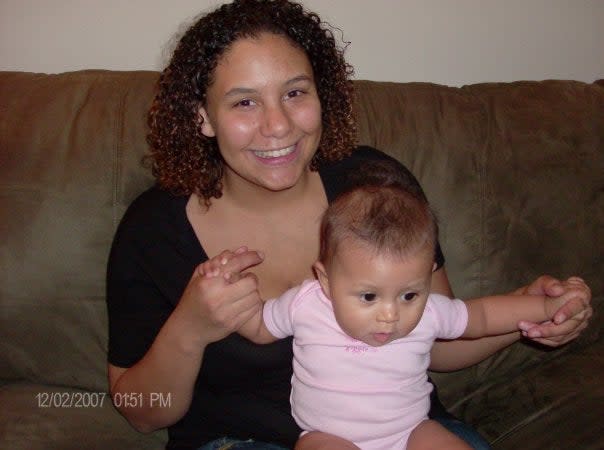Her Partner Abused Her, Now She's Sitting Behind Bars For His Crimes (Part 3)

This story was originally published by Mother Jones Magazine.
The officers did not seem to care about the abuse King had endured, abuse that began when she was just a child. She grew up in Stillwater, Oklahoma, the daughter of a Black mother who worked as a social worker and at the financial aid office of a junior college, and a white father who was a math instructor at Northeastern State University. King didn’t meet her father until she was 4.
Read more
When King was about 6, her mother, Lela Owens, grew suspicious after King accidentally peed in the driveway one afternoon while playing basketball. Owens took the girl to a therapist, who surmised she had been sexually abused multiple times. King remembers being molested by a preteen in a park when she was about 4.
As a kid, King liked animals and dreamed of becoming a veterinarian or a doctor; she wanted to take care of others. But by high school, King had lost much of that self-esteem and began hanging out with boys who used her for sex. “I wanted somebody to love me so bad, I didn’t care how they treated me,” she recalls. When she was 16, she met Ali Jordan Lalehparvaran, whom she would later marry. He was a couple of years older and seemed so sophisticated and kind. He would take her out for dinner or to the candy store for fudge. He bought her a diamond necklace. She’d never been treated that way by a boy before.
Months after they got together, Lalehparvaran learned that King had slept with other people before meeting him, and something seemed to snap. According to court records, one weekend they went boating and he smacked her on the head with an oar so hard she needed stitches. Another time, he broke her arm. But “I felt like I deserved it,” she says. “Like there must be something wrong with me…I had been very promiscuous and felt like I couldn’t do any better.”
At 20, she got pregnant with their first child, Persia. She was thrilled—she and Lalehparvaran had been trying to conceive for a while. “I always wanted a family,” she tells me. She loved the feeling of the baby moving inside her. “It’s just the most beautiful thing ever,” she recalls. She imagined putting her child in colorful dresses and fixing her hair. “I was really excited about it. I could see myself being able to take care of a girl.” She hoped that having a daughter would calm Lalehparvaran down.
They married and had two more kids, William and Lilah, and the violence escalated. While she was pregnant with Lilah, Lalehparvaran pushed King up against a wall and broke her clavicle. She left him and went to stay with her friends. But because Lalehparvaran had paid her bills, a relative told her to go back to her husband, and she did. Another night, Lalehparvaran, who was drunk, smacked a gun into King’s head and shot up their home with an AK-47. As the bullets flew, King told the kids to lie on the ground, covering them with her body. “I was in survival mode. I wasn’t thinking of anything except, I have to protect my kids,” she recalls. Lalehparvaran was sentenced to seven years in prison; they divorced in 2013.
Afterward, King struggled. She had a job at a pharmacy that paid $10 an hour, but she had just $800 in her bank account, not enough to cover the mortgage and keep the power and heat on. She tried to help her young children, who were missing their father. She showed them how to bake banana bread and solve math equations. She regularly drove them an hour away to visit their dad’s mom. On birthdays she organized parties and baked special cakes. “She was a good mother,” says Kathleen Araujo, Lalehparvaran’s aunt, who still spends time with the children. “If she loved you, she would do anything for you,” adds Melissa Williams, Lalehparvaran’s mother.
“I think a good mother is someone who can nurture them, loves them, and points them in the right direction,” King tells me. “Somebody that they can talk to, that they can rely on, that will always be there.”
She was 26 when she met John Purdy. Then 19, Purdy was handsome and athletic, with big brown eyes and chiseled, tattooed arms. And he made her laugh, a relief after such a volatile marriage. She sympathized with the challenges he’d overcome: As a boy, he’d been abused too.
In 2013, King got pregnant with their child, Trinity. “I was excited but kind of scared, because I wasn’t sure how he felt about it,” she says. Soon, court records show, the relationship took a turn. Purdy falsely accused her of getting pregnant by someone else. He started controlling her—dictating everything from her hairstyle to when and how she could use her phone.
Violence followed, she would later testify: One time he sliced through her calf with a kitchen knife and left a 2-inch cut. Sometimes he backhanded her or choked her. He did heroin in the house and demanded she join, even holding her arm down while his friend injected her. She imagined kicking him out but worried he would retaliate. “I was really scared, more than anything. I felt kind of trapped,” she says. In fact, experts say that leaving an abuser can be dangerous for women, and that many mothers with kids struggle to get away.
Purdy sometimes apologized, vowing to be better. “I believed him when he said he was never gonna do it again,” King later told investigators.
But he did.

After Purdy was arrested, Lilah went from the hospital to foster care and then to her paternal grandmother’s house, where she would stay as the investigation continued. King was devastated: “I was just in shock, just completely distraught, like I just didn’t know what to do,” she recalls of the separation from her kids. (Lilah’s older siblings, who had been living with King’s mom near Chicago, were allowed to stay there.) “It’s like my greatest fear came true.”
In jail, King was put on suicide watch, and she shivered and sweat as she withdrew from heroin. Her housemate bailed her out a few weeks later, but a court soon terminated King’s parental rights to Trinity, who was just 1 year old. Purdy also lost parental rights, but Trinity was adopted by his friend, a man who has prevented King from talking with the girl. It was “like my world was crushed,” King says. Unable to pay for a lawyer, King lost track of her court schedule and missed a hearing. As a result, she landed back in jail.
If she had any hope of getting her children back, King had to think carefully about her legal options. Her mom urged her not to plead guilty and instead to go to trial. It’s something she’s regretted ever since. “I gave her the most awful advice ever,” Owens tells me now. “I knew she wasn’t really guilty of anything, except being used and abused…[But] I should have told her to take the plea bargain.” At trial, “she went through hell, and nobody cared.”
Next: In Part 4, we explore the origins of failure-to-protect laws.

